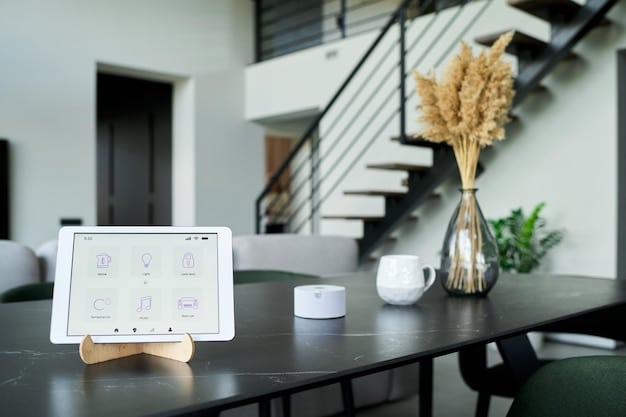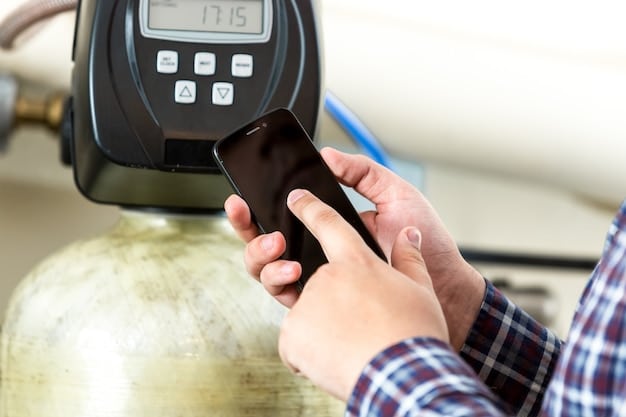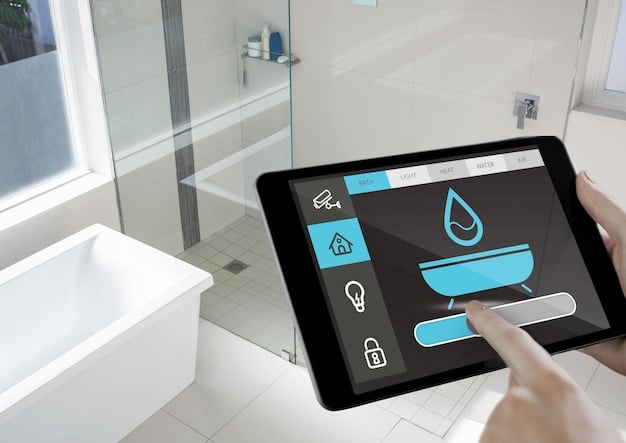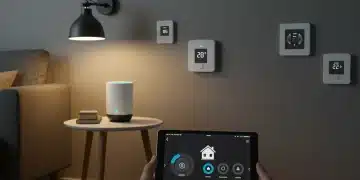Smart Home Devices: How to Cut Insurance Premiums by 5%

Smart home devices can significantly lower your insurance premiums by up to 5% through enhanced security features, reduced risks of damage, and real-time monitoring capabilities, making homes safer and more protected.
Did you know that upgrading your home with smart devices could lead to substantial savings on your insurance premiums? The financial impact: how smart home devices can lower your insurance premiums by 5%, making your home safer and saving you money.
Understanding the Basics of Smart Home Insurance Discounts
Smart home devices are revolutionizing how we protect our properties, and insurers are taking notice. These devices not only offer convenience but also play a crucial role in mitigating risks, which translates to savings on your home insurance.
Here’s what you need to know about leveraging smart technology to lower your insurance costs.
How Insurers View Smart Home Devices
Insurance companies assess risk when determining premiums. Devices that reduce the likelihood of claims are viewed favorably. Smart devices provide:
- Early detection of potential hazards like leaks and fires.
- Enhanced security to deter theft and vandalism.
- Data that can help homeowners manage their properties more effectively.
Types of Smart Home Devices That Qualify for Discounts
Not all smart devices qualify for insurance discounts. The most effective ones directly contribute to risk reduction.
- Smart Smoke Detectors: Detect smoke and carbon monoxide, alerting you even when you’re away.
- Water Leak Sensors: Monitor for leaks and shut off water supply to prevent damage.
- Smart Security Systems: Include cameras, door/window sensors, and professional monitoring.
- Smart Thermostats: Help prevent frozen pipes in winter by maintaining safe temperatures.

Essentially, any device that makes your home less prone to damage or theft can potentially lower your insurance premiums.
Maximizing Savings with Smart Smoke and Carbon Monoxide Detectors
Fire and carbon monoxide pose significant risks to homeowners. Smart detectors offer enhanced protection and can lead to considerable insurance discounts.
Let’s explore how these devices work and why insurers value them.
Advanced Features of Smart Smoke Detectors
Unlike traditional smoke detectors, smart versions offer several advantages:
- Remote monitoring via smartphone apps.
- Interconnectivity, so all detectors sound an alarm when one detects smoke.
- Early warnings that differentiate between steam and smoke to reduce false alarms.
- Automatic notifications to emergency services.
How Insurers Calculate Discounts for Smart Detectors
Insurance companies recognize the value of these advanced features and often provide discounts ranging from 2% to 5%.
The discount is based on factors like:
- The number of detectors installed.
- Whether the system is professionally monitored.
- The device’s certification and reliability.
By investing in a smart smoke and carbon monoxide detection system, you not only protect your family but also save money on your insurance premiums.
Reducing Water Damage with Smart Leak Detection Systems
Water damage is one of the most common and costly home insurance claims. Smart leak detection systems can mitigate this risk, benefiting both homeowners and insurers.
These systems provide real-time monitoring and can prevent extensive damage.
Smart leak detection systems are a great investment. They can prevent significant water damage, and in turn, reduce insurance costs.
How Smart Leak Detection Systems Work
These systems use sensors placed in areas prone to leaks, such as near water heaters, washing machines, and pipes.
They offer the following benefits:
- Immediate alerts via smartphone when a leak is detected.
- Automatic water shut-off to minimize damage.
- Data on water usage to identify potential issues.

Insurance Discounts for Smart Leak Detection
Insurers offer discounts for homes equipped with these systems, typically ranging from 2% to 10%, depending on the system’s capabilities and the insurer’s policies.
Enhancing Home Security with Smart Security Systems
Home security is a primary concern for homeowners, and smart security systems provide advanced protection against theft and vandalism.
These systems offer a range of features that can deter criminals and reduce insurance premiums.
A monitored smart security system is therefore a great method to deter intruders and save on insurance costs.
Components of a Smart Security System
A comprehensive smart security system includes:
- Security cameras with remote monitoring.
- Door and window sensors.
- Motion detectors.
- Professional monitoring services.
How Security Systems Lower Insurance Premiums
Insurance companies offer discounts for homes with monitored security systems, as they significantly reduce the risk of burglary and property damage.
Discounts typically range from 5% to 15%, depending on the level of security provided.
Smart Thermostats and Preventing Frozen Pipes
Frozen pipes can cause extensive water damage and costly repairs. Smart thermostats can help prevent this issue, especially in colder climates.
By maintaining a consistent temperature, smart thermostats reduce the risk of pipes freezing and bursting.
They are a worthwhile investment when it comes to home upkeep. Moreover, they can help prevent frozen pipes and water damage.
Benefits of Smart Thermostats
Smart thermostats offer numerous advantages:
- Remote temperature control via smartphone.
- Automated temperature adjustments based on weather forecasts.
- Energy-saving modes that reduce utility bills.
Insurance Benefits of Smart Thermostats
While the direct insurance discount for smart thermostats may be smaller (around 1% to 3%), the real benefit lies in preventing costly water damage from frozen pipes.
Some insurers offer additional discounts when smart thermostats are part of a broader smart home system.
Navigating Insurance Policy Details and Fine Print
Before investing in smart home devices for insurance discounts, it’s essential to understand the specifics of your insurance policy and how it applies to smart technology.
Not all policies are created equal, and some may offer better discounts or coverage for smart devices than others.
So, doing research, and talking to your insurance company is always a great idea.
Checking Policy Coverage for Smart Devices
Review your policy to ensure it covers smart home devices and any related damages.
- Does the policy cover the cost of replacing damaged or stolen smart devices?
- Are there any exclusions for damages caused by smart device failures?
- Does the policy require specific types of smart devices for discounts?
Talking to Your Insurance Provider
Contact your insurance provider to discuss available discounts for smart home devices. Ask about:
- Specific devices that qualify for discounts.
- Documentation required to prove installation and functionality.
- Potential increase in coverage limits for added protection provided by smart devices.
| Key Point | Brief Description |
|---|---|
| 🛡️ Security Systems | Reduce theft risk, offering 5-15% insurance discounts. |
| 🔥 Smoke Detectors | Provide early alerts and emergency notifications. |
| 💧 Leak Sensors | Minimize water damage with immediate shut-off, saving up to 10%. |
| 🌡️ Smart Thermostats | Prevent frozen pipes, offering smaller discounts but significant prevention. |
FAQ Section
▼
Smart smoke detectors, water leak sensors, security systems, and thermostats are common devices that can qualify you for discounts. They improve safety and reduce potential claims.
▼
Savings vary, but you can often lower your insurance premiums by up to 5% with a combination of smart devices that protect your home from water damage, theft, and fire.
▼
While it’s likely, it’s not guaranteed. Check with your insurance provider to confirm which systems they recognize and the discounts they offer for installed smart home technologies.
▼
This depends on your specific policy. Review your coverage details to see if smart devices are included and under what circumstances replacements or repairs are covered.
▼
Contact your provider and provide documentation such as receipts and installation confirmations. Some insurers may request a home inspection to verify the installation and functionality.
Conclusion
Investing in smart home devices is a smart move for both safety and your wallet. By taking advantage of the financial impact: how smart home devices can lower your insurance premiums by 5%, you can protect your home, reduce risks, and enjoy significant savings on your insurance costs.





